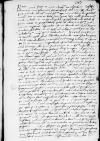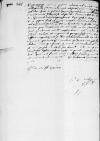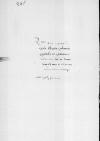Letter #1728
Ioannes DANTISCUS to Tiedemann GIESELöbau (Lubawa), 1537-09-28
English register: Dantiscus is replying to Giese’s letter. He thinks Giese’s scruples as to using the titles due to a bishop are unjustified. He agrees with Giese’s and the Warmia Chapter’s suggestion that the bishop elect be notified officially of his election, and the congratulations and thanks be dealt with, after the assembly. He will let Giese know of a convenient date. He advises Giese not to distress himself about Płotowski and Niederhoff’s conduct. He has already written to Płotowski in a manner that will dissuade him from showing the letter to anyone. Dantiscus informs Giese that, through the Fuggers’ bank, he will soon send Dietrich von Rheden in Rome copies of the documents and letters concerning postulation of Giese’s election to the Chełmno bishopric. Dantiscus also intends to ask Rheden to endeavor to arrange for a reduction of the fees for confirmation of the Chełmno bishop’s election. As Chełmno bishop elect, Dantiscus himself had been forced to pay the full sum of 700 ducats, which he thinks was unfair. He encourages Giese to take action on this matter. He also promises Giese to run his election for bishop through the Chełmno Chapter in accordance with both the Chapter’s and the king’s prerogatives. Dantiscus asks Giese to send him 1000 ducats to pay the annates in Rome. He thinks a direct conversation between him and Giese is necessary, both as to the dispatching of the money and as to who will be the messenger going to Rome. Dantiscus informs Giese that he has sent Chojeński the document of resignation from the Warmia canonry in favor of Hozjusz, but he still hopes this document will not be used. Dantiscus is setting off for the assembly. He will stay the night in Płowęż, and will reach Grudziądz the next day. He asks Giese to explain to the canons, and especially Felix Reich, that he didn’t have enough time to reply to the letter. Tonight he will be working on letters to Cracow and Rome. He sends Giese greetings from Nipszyc and his request not to lend any money to Nipszyc’s servant Bernard if he should ask for a loan, but to take away his horse as it belongs to Dantiscus. Dantiscus asks Giese to write to him in Lubawa, because he is leaving his brother there, who will make sure his post is delivered.
| received [1537]-09-30 Manuscript sources:
Prints:
| ||||||||||||||||
Text & apparatus & commentary Plain text Text & commentary Text & apparatus Excerpts concerning Dantiscus' travels
Reverendissimo Domino
Reverendissime Domine, Frater et Amice carissime ac observan(de) or observan(dissime)⌈observan(de)observan(de) or observan(dissime)⌉. Salutem amorisque mei plurimam commendationem.
Ab hac appellatione, qua merito cum Dominatione Vestra Reverendissima ago, non me continebo, quemadmodum hoc a me in cf.
Quod
Decretum postulationis et litteras Dominationis Vestrae Reverendissimae unacum regiis, quas spero me non gravate duplicatas, ut vocant, habiturum, per bancum opera
ms 1 factore⌈factorisms 2 3 4 factoris,
ms 1 factore⌉ mittam ad
Cum transumpto regiarum litterarum cum
De
 BCz, 244, p. 244 Rescripsissem Dominationi Vestrae Reverendissimae uberius ad omnia, nisi
ms 2 3 4 iam,
BCz, 244, p. 244 Rescripsissem Dominationi Vestrae Reverendissimae uberius ad omnia, nisi
ms 2 3 4 iam,
ms 1 [iam] paper damaged⌈iamms 2 3 4 iam,
ms 1 [iam] paper damaged⌉ colligendae sarcinulae me abstraherent, iamque ms 2 3 4 paratus,
ms 1 para[tus] paper damaged⌈paratusms 2 3 4 paratus,
ms 1 para[tus] paper damaged⌉ ad iter hac, si potero, hora sex ab hinc milliaria ms 2 3 4 ad,
ms 1 a[d] paper damaged⌈adms 2 3 4 ad,
ms 1 a[d] paper damaged⌉ curiam meam
ms 1 fav[en]te paper damaged⌈faventems 2 3 4 favente,
ms 1 fav[en]te paper damaged⌉
ms 1 pot[ui] paper damaged⌈potuims 2 3 4 potui,
ms 1 pot[ui] paper damaged⌉. Omnia, quae
Orator noster
ms 1 vo[s] paper damaged⌈vosms 2 3 4 vos,
ms 1 vo[s] paper damaged⌉ veniret pecuniamque in mutuum peteret, ne quid illi ms 2 3 4 credatur,
ms 1 [cre]datur paper damaged⌈credaturms 2 3 4 credatur,
ms 1 [cre]datur paper damaged⌉, immo quod equus, qui meus est, retineatur, non se enim gessit, ut fide sit dignus. Dominationem Vestram Reverendissimam diutissime
optime valere opto. Si quid rescribendum videbitur, huc ad fratrem meum[4] mittat litteras, qui curabit, ut ad me ms 2 3 4 perferantur,
ms 1 perferentur⌈perferanturms 2 3 4 perferantur,
ms 1 perferentur⌉.
Ex
Reverendissimae Dominationis Vestrae frater integerrimus


